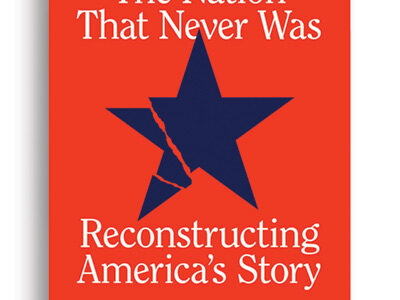Reviving a mindset conducive to compromise is essential, but it won’t be easy.
By Amy Gutmann | Upon leaving the Constitutional Convention in 1787, our founder, Benjamin Franklin, was approached by Mrs. Powel of Philadelphia. She asked, “Well, Doctor, what have we got?” Franklin replied, “A republic, if you can keep it.” For more than 200 years, we have kept it. At times amazing and inspiring, at times distressing, we have kept it. But how confidently can we continue to keep it?
I pose this question because so many Americans, including members of our Penn family, and from a wide range of political perspectives, are concerned that our public debate and discourse has become so hateful, so untruthful, so raw, so much of the time, that our very pursuit of the public good is threatened. As members of an academic community dedicated to using our knowledge to promote and advance the public good, we share a responsibility to address this concern.
Examples of striking incivility can be found across the political spectrum. Presidents George W. Bush and Barack Obama have both been labeled “fascists,” and President Obama has been frequently portrayed as Hitler. Even after the tragedy in Tucson, an Indiana deputy attorney general tweets to Mother Jones magazine that police should use “live ammunition” against Wisconsin labor protestors, and the current governor of Maine tells a group of fishermen last fall that if he were elected he would tell President Obama “to go to hell.”
How concerned should we be about the tenor of our public discourse?
We might begin by recognizing that incivility has always been part of our body politic. General George McClellan once called his commander-in-chief, President Lincoln, “Nothing more than a well-meaning baboon.” An early editorial claimed that if Thomas Jefferson were elected, “Murder, robbery, rape, adultery, and incest will be openly taught and practiced,” and James Madison once labeled George Washington, “insane.”
Is incivility in contemporary public life more damaging than at other points in our history? Reflecting on our history gives us reason to believe that it is not the presence of incivility in our public life, but rather its ubiquity in contemporary public discourse that makes it potentially so damaging. Constitutional democracy depends on both protecting rights and promoting responsibilities. Incivility in American politics over the past decades has become so widespread, and so rewarded by so many powerful institutions, that our right to free speech has been divorced from any effective sense of civic responsibility.
If we want to redress this balance, if we want to ensure a civic dialogue that advances the common good while also respecting, and even appreciating, the passionate voices of protest, we must address two significant challenges. The first challenge is to reduce the excess of polarizing rhetoric in the body politic. The second is to revive a mindset conducive to compromise.
When it comes to polarizing rhetoric, we know that democracies are well served by robust and passionate public argument. The problem arises when polarizing rhetoric so dominates democratic politics that it shuts out constructive consideration of competing values and respect for political adversaries. Polarizing rhetoric can be as psychologically tantalizing as the twists and turns in a Dan Brown novel, and often as entertaining. Unfortunately, when it dominates public discourse, it drives citizens into becoming disdainful enemies in rhetorical warfare. It denigrates and degrades rather than respects those with opposing viewpoints, making it far more difficult to deliberate and to bridge reasonable differences.
To put it metaphorically, polarizing rhetoric is junk food for the body politic. Consumed in “supersize” quantities, it clogs the two major arteries that nourish constitutional democracy: the expression of mutual respect across differences and the willingness to compromise. When these two arteries are clogged, democracies do not pursue the kind of civic dialogue that simultaneously promotes the majority will, while also listening to, and learning from, minority voices.
The most powerful antidote to polarizing rhetoric is education in robust, reasoned, and respectful political debate. We must teach students, future citizens and leaders of our democracy, how to engage with one another over controversial issues. We must ensure that they are exposed to the widest spectrum of viewpoints, guaranteeing that they encounter beliefs that challenge their own. We must help them to understand and engage with the views of others, without knee-jerk reliance on the crutch of character assassination. We must also help them to recognize polarizing rhetoric when they hear it, and to appreciate its dangers before they habitually speak it.
What is most insidiously destructive about polarizing rhetoric is how it facilely disrespects democratic opponents and brazenly severs the most fundamental ties of humanity that draw one to compromise with ideological adversaries. Yet almost everyone recognizes that, just as politics is the art of the possible, compromise is the soul of democracy. This, in short, is why we must revive a mindset conducive to compromise.
Unfortunately, compromise is extremely difficult to achieve in our current political atmosphere. Every major compromise, while giving all parties something that they want, requires all to sacrifice something that they value by making difficult, and often painful, concessions to an organized opposition. Compromise, therefore, typically leaves all parties dissatisfied. As essential as compromise is to democracy, it is also an uphill battle.
In a recent article in Perspectives on Politics, Dennis Thompson and I argue that the ability to negotiate a successful compromise, particularly in an era of polarized politics, depends on cultivating a mindset that encourages politicians to adapt their principles and to respect their opponents. This mindset promotes attitudes and arguments that help us to work in common cause for the common good. The compromising mindset, above all, focuses our attention on the most critical question for governing: Compared to the realistic alternatives, does this compromise promote the principles of both sides better than the status quo?
However, the massive incursion of campaigning into governing, the so-called “permanent campaign,” fuels a mindset that opposes compromise. The uncompromising mindset, very conducive to campaigning, encourages politicians to stand firmly on principles that appeal to their base, and it spawns mistrust of their opponents. This mindset may help win elections, but it stymies effective governing, biasing the democratic process in favor of the status quo, and blocking it from advancing the public good.
I want to stress that the uncompromising mindset is not inherently bad, let alone evil; it is important, perhaps even essential, to campaigning for office. The problem of the uncompromising mindset, like that of polarized rhetoric, is not its presence, but rather its ubiquity, which has upset the delicate balance of “campaigning” and “governing” in American politics. Like weeds in a garden, campaigning has now grown out of its natural environment and threatens to choke the very process of governing.
The incursion of campaigning into governing is not necessarily greater than other factors that make compromise difficult, such as the 24/7 segmented media market, but the mindset associated with campaigning, with its overriding goal of producing a winner, reinforces and exacerbates all the other factors.
Even the sharp ideological differences associated with political polarization pose far less of an obstacle to compromise in the absence of the continual pressures of campaigning. The Tax Reform Act of 1986, the most comprehensive tax reform bill in modern American history, was forged with the support of a bipartisan group, which included Democrats Tip O’Neil, Dan Rostenkowski, and Bill Bradley, and Republicans Bob Packwood, and President Ronald Reagan. They were all strong partisans, but they were also prepared to take responsibility for governing.
Even in our current atmosphere of the non-stop campaign, we may be seeing some glimmers of hope. Last December, President Obama, Congressional Democrats and Republicans reached a compromise to extend both the Bush-era tax cuts and unemployment benefits. Although the success of this compromise reflects the unusual landscape of a lame-duck Congress, the victory for both sides reinforces the importance of extending the compromising mindset beyond lame-duck sessions.
There is another glimmer of hope in the Senate, where a new “gang of six,” Democrats Mark Warner, Dick Durbin, and Kent Conrad and Republicans Saxby Chambliss, Mike Crapo, and Tom Coburn are working on a bipartisan debt-reduction plan. They are debating goals, numbers, deadlines, and legislative procedures. Instead of just engaging in a polarized “point-counterpoint,” they are responsibly addressing some tough and critically important issues across the aisle.
For efforts like these to multiply and result in legislative decisions that serve the public good, we must find ways of shifting the balance in our democratic process toward governing and away from the permanent campaign. We cannot wait for the media and politicians to reform themselves. Citizens can play an important role by resisting the siren’s song of polarizing rhetoric when we hear it, and by supporting political leaders whose rhetoric is respectful, and whose willingness to compromise is robust.
The capacity for compromise, for cooperation across party lines for a publicly worthy goal, has long been one of our democracy’s greatest natural resources. It is a resource we have been squandering, but one that we desperately need.
If we do our best to reduce the excess of polarizing rhetoric in our public discourse, and to revive a mindset conducive to compromise, we will balance our cherished right to free speech with a civic responsibility to work for the common good. We will also help engender a national dialogue that simultaneously advances the common good and respects the voices of protest. Most important, we will help ensure the future of our Republic.




